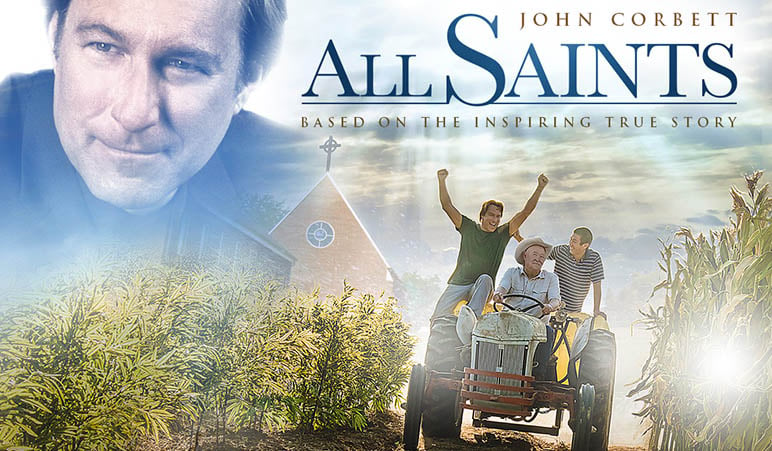In the new faith based film All Saints, (in theaters Sept. 2017) newly ordained, Michael Spurlock’s first assignment is to pastor All Saints, a struggling church in Tennessee with and handful of members and a mortgage beyond its means. The best option may be to sell the church. But when All Saints church hesitantly risks welcoming a community of Christian Karen refugees from Burma–former farmers scrambling for a fresh start in America—Pastor Michael feels they may be called to an improbable new mission. Michael must choose between closing the church and selling the property–or listening to a still, small voice challenging the people of All Saints to risk it all and provide much-needed hope to their new community. Together with the Karen refugees, they risk everything to plant seeds for a future that might just save them all.
“Importantly, this revival (of a church) happens when the church turns outward, looking both to help those who showed up as outsiders and also to receive help from the wider community, instead of focusing inward on maintaining self-sufficiency. When the church faces a crisis toward the end of the film, even non-Christians show up to help out, because they can see the good work the church is doing. It is like Matthew 5:14-16 in action. In simplest terms All Saints makes the argument that love is the best apologetic for the truth of the gospel.”
This Postmodern Realities episode is a conversation with Journal author John McAteer about his web film review “The Apologetics of Community in All Saints.”
We’d also like to invite you to subscribe to the Journal. To subscribe to the Journal, please click here.
When you to subscribe to the Journal, you join the team of print subscribers whose paid subscriptions help provide the resources at equip.org that minister to people worldwide. These resources include our free online-exclusive articles, such as this review, as well as our free Postmodern Realities podcast.
Another way you can support keeping our resources free is by leaving us a tip. A tip is just a small amount, like $3 or $5, which is the cost for some of a latte, lunch out, or coffee drink. To leave a tip, click here.
Other articles and Postmodern Realities podcasts related to this topic:
Episode 139 Clear Skies, Hurt Hearts, Can’t Lose: Why Spielberg’s Aliens Help Make us More Human
Clear Skies, Hurt Hearts, Can’t Lose: Why Spielberg’s Aliens Help Make us More Human
Episode 123 Tolkien’s First Fellowship
Tolkien’s First Fellowship A film review of Tolkien
Episode 100: A. Hitchcock Films
“Caught Looking: Hitchcock’s Films in the Age of Instagram.”
Episode 001: The Films of Quentin Tarantino
Episode 067: Spielberg’s Nostalgia for Reality in Ready Player One
Spielberg’s Nostalgia for Reality in Ready Player One.”
Episode 054: The Last Jedi: A Star Wars Movie for the Era of “the Nones”
The Last Jedi: A Star Wars Movie for the Era of “the Nones”
Episode 027: “Evaluating the Star Wars Worldview”
May the Force Bewitch You: Evaluating the Star Wars Worldview
Episode 075: Film Nostalgia & Heaven
Looking for Heaven at the Movies: What our Fondness for Nostalgic Films Says about Us.”
“HBO’s Westworld and the Ethics of Artificial Intelligence.”
Episode 041: The Gracious Heroism of Wonder Woman
The Gracious Heroism of Wonder Woman
Episode 039: The Gospel According to Marvel
The Gospel According to Marvel
Episode 024: Dr. Strange (film review with spoilers)
Fighting Scientism with the Occult in Doctor Strange
Episode 017: Suicide Squad, Deadpool, and the Rise of the Comic Book Antihero
Suicide Squad, Deadpool, and the Rise of the Comic Book Antihero
Jesus Films: Who Does Hollywood Say That I Am?
Episode 079: Theology of Morgan Freeman
“The Story of Morgan Freeman (Not God).”
The Artistic Pro-Life Theme in Netflix’s I Am Mother
Postmodern Realities Episode 132: The Artistic Pro-Life Theme in Netflix’s I Am Mother
The Matrix: Unloaded Revelations
Breaking Bad’s Addicting Defense of Moral Realism
A Wrinkle in Time: Drawing Apologetic Value from a De-Christianized Film
